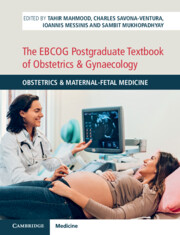Book contents
- The EBCOG Postgraduate Textbook of Obstetrics & Gynaecology
- The EBCOG Postgraduate Textbook of Obstetrics & Gynaecology
- Copyright page
- Dedication
- Contents
- Contributors
- Preface
- Section 1 Basic Sciences in Obstetrics
- Section 2 Early Pregnancy Problems
- Section 3 Fetal Medicine
- Section 4 Maternal Medicine
- Chapter 25 Hypertensive Disorders in Pregnancy and Eclampsia
- Chapter 26 Obesity and Metabolic Syndrome in Pregnancy
- Chapter 27 Screening for Gestational Diabetes Mellitus and Care of Diabetes Mellitus in Pregnancy
- Chapter 28 Cardiac Disease in Pregnancy
- Chapter 29 Respiratory Disease in Pregnancy
- Chapter 30 Thromboembolism in Pregnancy
- Chapter 31 Haemoglobinopathies in Pregnancy
- Chapter 32 Kidney Diseases in Pregnancy
- Chapter 33 Gastrointestinal Disorders in Pregnancy
- Chapter 34 Systemic Lupus Erythematosus and Pregnancy
- Chapter 35 Autoimmune Rheumatic Disorders in Pregnancy
- Chapter 36 Thyroid Disease in Pregnancy
- Chapter 37 Infections in Pregnancy
- Chapter 38 HIV Infection in Pregnancy
- Chapter 39 Acute Management of Sepsis in Pregnancy
- Chapter 40 Psychological Disorders in Pregnancy
- Chapter 41 Pregnancy after Solid Organ Transplantation
- Chapter 42 Oral Health and Periodontal Diseases in Pregnancy
- Section 5 Intrapartum Care
- Section 6 Neonatal Problems
- Section 7 Placenta
- Section 8 Public Health Issues in Obstetrics
- Section 9 Co-Morbidities during Pregnancy
- Index
- Plate Section (PDF Only)
- References
Chapter 34 - Systemic Lupus Erythematosus and Pregnancy
from Section 4 - Maternal Medicine
Published online by Cambridge University Press: 20 November 2021
- The EBCOG Postgraduate Textbook of Obstetrics & Gynaecology
- The EBCOG Postgraduate Textbook of Obstetrics & Gynaecology
- Copyright page
- Dedication
- Contents
- Contributors
- Preface
- Section 1 Basic Sciences in Obstetrics
- Section 2 Early Pregnancy Problems
- Section 3 Fetal Medicine
- Section 4 Maternal Medicine
- Chapter 25 Hypertensive Disorders in Pregnancy and Eclampsia
- Chapter 26 Obesity and Metabolic Syndrome in Pregnancy
- Chapter 27 Screening for Gestational Diabetes Mellitus and Care of Diabetes Mellitus in Pregnancy
- Chapter 28 Cardiac Disease in Pregnancy
- Chapter 29 Respiratory Disease in Pregnancy
- Chapter 30 Thromboembolism in Pregnancy
- Chapter 31 Haemoglobinopathies in Pregnancy
- Chapter 32 Kidney Diseases in Pregnancy
- Chapter 33 Gastrointestinal Disorders in Pregnancy
- Chapter 34 Systemic Lupus Erythematosus and Pregnancy
- Chapter 35 Autoimmune Rheumatic Disorders in Pregnancy
- Chapter 36 Thyroid Disease in Pregnancy
- Chapter 37 Infections in Pregnancy
- Chapter 38 HIV Infection in Pregnancy
- Chapter 39 Acute Management of Sepsis in Pregnancy
- Chapter 40 Psychological Disorders in Pregnancy
- Chapter 41 Pregnancy after Solid Organ Transplantation
- Chapter 42 Oral Health and Periodontal Diseases in Pregnancy
- Section 5 Intrapartum Care
- Section 6 Neonatal Problems
- Section 7 Placenta
- Section 8 Public Health Issues in Obstetrics
- Section 9 Co-Morbidities during Pregnancy
- Index
- Plate Section (PDF Only)
- References
Summary
Systemic lupus erythematosus (SLE) is a chronic multi-organ inflammatory disease which can involve any organ or system. It is an autoimmune condition with an overproduction of autoantibodies directed against various nuclear components and cell-surface antigens. The underlying cause of the condition is unknown, but it is likely multifactorial with genetic and environmental factors having a role. The incidence is higher in women than in men; some sources quote this as high as 9:1, and is even higher during the reproductive years [1, 2].
- Type
- Chapter
- Information
- The EBCOG Postgraduate Textbook of Obstetrics & GynaecologyObstetrics & Maternal-Fetal Medicine, pp. 287 - 294Publisher: Cambridge University PressPrint publication year: 2021

